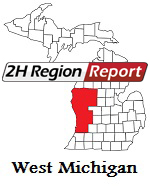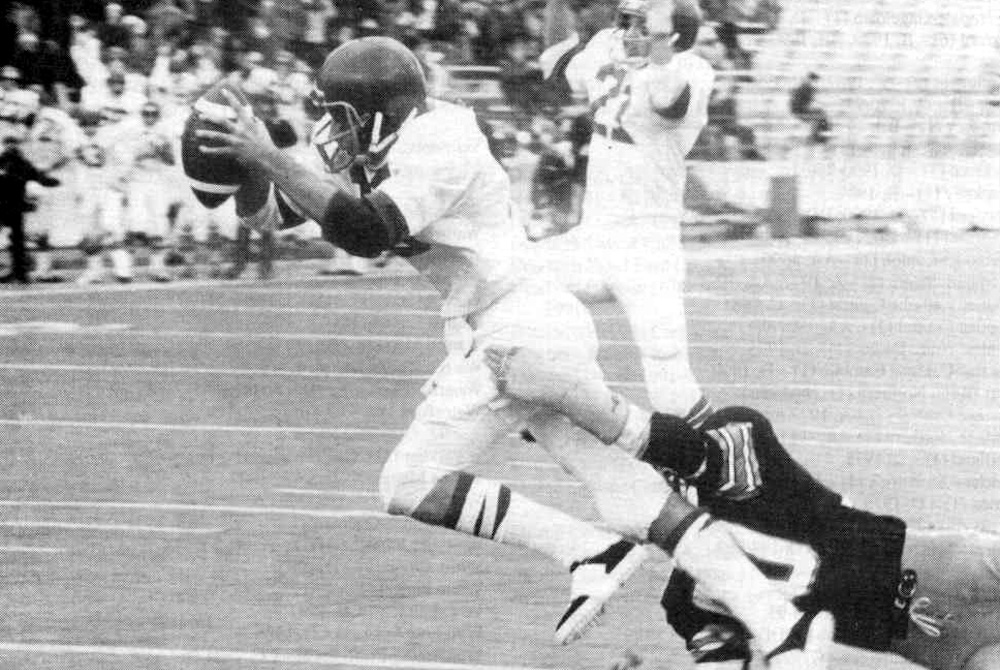
Nightmare Ends with Shanks' Dream Finish
December 6, 2017
By Tom Kendra
Special for Second Half
The media were fixated on La’Darius Jefferson, and who can blame them?
 The senior quarterback validated his recent selection as the MLive statewide Football Player of the Year by rushing 32 times for 245 yards and all four of Muskegon’s touchdowns in a 28-10 victory over Farmington Hills Harrison in the MHSAA Division 3 Final on Nov. 25 at Ford Field. He followed that up by giving the dejected Harrison players a classy postgame pep talk.
The senior quarterback validated his recent selection as the MLive statewide Football Player of the Year by rushing 32 times for 245 yards and all four of Muskegon’s touchdowns in a 28-10 victory over Farmington Hills Harrison in the MHSAA Division 3 Final on Nov. 25 at Ford Field. He followed that up by giving the dejected Harrison players a classy postgame pep talk.
If it wasn’t Jefferson, the cameras were focused on eighth-year Muskegon head coach Shane Fairfield, who overcame four losses in the title game by finally taking the final step and hoisting the championship trophy,
But the best story coming out of Muskegon’s recently-won title belonged to senior cornerback Willie “Bo” Shanks – a tale that started with heartbreak, which morphed into an ongoing nightmare, which had to be confronted and converted into motivation, then mixed in with relentless hard work before finally culminating with redemption. Sweet redemption.
“It felt great; it felt right,” said Shanks, the soft-spoken leader of the Big Reds’ secondary. “I guess the lesson in my story is that with focus and hard work, you can overcome anything.”
The heartbreak occurred one year ago, when Shanks was playing cornerback on the final play in Muskegon’s heartbreaking 2016 Division 3 Final 29-28 loss to Orchard Lake St. Mary’s. Shanks was running with receiver Ky’ren Cunningham, who abruptly turned in at the goal line. Before Shanks could react, the ball was in Cunningham’s arms on the ground in the end zone with six seconds showing on the clock, courtesy of a perfectly-timed pass from quarterback Caden Prieskorn.
 Even though player after player, coach after coach, fan after fan, and family member after family member pointed out that it wasn’t just one play which cost Muskegon the championship, Shanks couldn’t shake it off.
Even though player after player, coach after coach, fan after fan, and family member after family member pointed out that it wasn’t just one play which cost Muskegon the championship, Shanks couldn’t shake it off.
"I think about it every play," the soft-spoken Shanks said earlier this season. "I think about it every day in practice. I think about it every time we go out and play a game. I even think about it when I`m asleep. I have nightmares about it, so it just motivates me a lot to not let it happen again."
Fairfield decided right away that the best way to deal with the pain of that loss was to bring it out in the open – confront it and then work to overcome it.
“We got beat with six seconds left, so everything ever since has been six more reps, six more sprints, six more drills,” said Shanks, a 6-foot-2, 180-pound senior who is also a starting guard on Muskegon’s basketball team, which opens its season Friday at home against Rockford.
The hard work by Shanks and fellow seniors Clinton Jefferson and Marvin Harwell and junior Lamarion Sherrill turned Muskegon’s perceived Achilles heel – pass defense – into a strength.
In both of Muskegon’s losses in 2016, against visiting Chicago Lincolnshire Stevenson (38-35) in Week 2 and the Final against St. Mary’s, the Big Reds were torched through the air. Led by Shanks in the secondary, the Big Reds fielded a defense for the first time in years this fall that was equally good against the run and the pass – with only Muskegon Mona Shores having even a modicum of success passing.
“He was our solid rock all year back in the secondary,” Fairfield said of Shanks, who is now hoping to play defensive back at the college level.
 Shanks had his individual highlight in the Regional championship game against DeWitt on Nov. 10 at Grand Haven, when he intercepted three passes (including one he took back for a touchdown) as Muskegon rolled to a shocking 49-0 victory. Those three interceptions gave him 10 for the season, breaking the school record of eight held by three players, including ex-Southern Cal standout and NFL player Ronald Johnson.
Shanks had his individual highlight in the Regional championship game against DeWitt on Nov. 10 at Grand Haven, when he intercepted three passes (including one he took back for a touchdown) as Muskegon rolled to a shocking 49-0 victory. Those three interceptions gave him 10 for the season, breaking the school record of eight held by three players, including ex-Southern Cal standout and NFL player Ronald Johnson.
If the story ended right there, it would have been a much happier ending than most ever get in the sports world. Sports Illustrated and others have told countless stories of wayward kickers, not to mention recognizable figures like Bill Buckner and Steve Bartman, who never quite recovered from a single play during a game.
But this story had a perfect ending not only for Shanks, but for the Muskegon football program as well.
After dispatching overmatched Battle Creek-Harper Creek, 42-0, in the Semifinals, Muskegon returned to the familiar confines of Ford Field, almost one year to the day of its last-second defeat.
No worries this time around. When the scoreboard clock reached :06 this year, the Big Reds were comfortably in celebration mode.
6, 5, 4, 3, 2, 1 …0.
For Jefferson, Fairfield and the entire Muskegon football family, it was a dream come true.
And for one Big Red in particular, it also was a nightmare vanquished.
 Tom Kendra worked 23 years at The Muskegon Chronicle, including five as assistant sports editor and the final six as sports editor through 2011. E-mail him at [email protected] with story ideas for Muskegon, Oceana, Mason, Lake, Oceola, Mecosta and Newaygo counties.
Tom Kendra worked 23 years at The Muskegon Chronicle, including five as assistant sports editor and the final six as sports editor through 2011. E-mail him at [email protected] with story ideas for Muskegon, Oceana, Mason, Lake, Oceola, Mecosta and Newaygo counties.
PHOTOS: (Top) Muskegon senior cornerback Willie Shanks tackles Farmington Hills Harrison receiver Joe Stevens during the Division 3 Final. (Middle) Shanks defends Grand Rapids Christian's Duane Washington during last year's Class A Regional at Grand Haven. Muskegon entered the game undefeated, before falling to the Eagles. (Below) Muskegon football coach Shane Fairfield, left, and Muskegon basketball coach and athletic director Keith Guy pose with the Class A District championship trophy after the Big Reds defeated Zeeland West this fall. Fairfield and Guy sharing great athletes like Shanks has put Muskegon’s programs among the state's elite in both football and basketball. (Photos by Tim Reilly.)

1975 Ishpeming Title Made National News, Set Standard for Success to Come
By
Jason Juno
Special for MHSAA.com
November 22, 2024
ISHPEMING — Before the 1975 season started, Ishpeming football players talked about the possibility of playing Hudson for a Class C championship.
That was no easy task with just four teams in each Class making the playoffs during the first year the MHSAA sponsored a football tournament.
“We just said to ourselves, ‘Wouldn’t it be something if we played them in the state championship game?’” said Mark Marana, Ishpeming’s all-state quarterback.
When that dream came true, the Hematites felt confident they could defeat Hudson, Marana said, no matter how improbable it appeared.
Hudson entered the 1975 Class C championship game on a 72-game winning streak. The Tigers had been featured in Sports Illustrated, and they were highlighted on TV before a Sunday of NFL games. Everyone knew about Hudson.
When Ishpeming beat the Tigers, the New York Times published a wire story about it.
The Hematites stunned everyone but themselves with that 38-22 victory to become the first Class C champions in Michigan.
“It was one of the greatest things I’ve been a part of in my lifetime,” Marana said.
He said they’re still celebrating the title, and he’s 67 years old.
“It was really a highlight in our community, naturally,” Marana said. “When you’re a Yooper, I think we had the whole U.P. going for us to win the game and the state championship. It was great; we were an underdog going in. They were a good team, but we were also good ourselves.”
The Hematites played bigger schools throughout most of their schedule, including undefeated Class A Marquette, which likely helped them clinch one of the four playoff spots.
“We had some talent,” Marana said. “We had a great tailback in Mike Dellangelo (5-foot-6, 160 pounds). We were doing some things offensively that people weren’t doing at the time. We were running the option game out of the I formation. We had multiple formations, which a lot of teams didn’t do at that time.”
Ishpeming jumped Hudson early. Bill Andriacchi blocked a punt to set up the first score of the game, and Ishpeming led 24-8 after the first quarter.
Hematites’ coach Mike Mileski emphasized the importance of that play to the Green Bay Press-Gazette.
“We had three guys scout Hudson in their Semifinal, and one of the things we thought we could do was block their punts,” he said. “We had four different rushes planned, and we just called the right one in that case. It was our game after that.”
“There was pressure on those guys,” Marana said. “That was one thing that was real critical is that we jumped out to a great start.”
Dellangelo rushed for 158 yards on 21 carries and scored two touchdowns in the championship game played at Central Michigan University.
He scored his first touchdown on a 60-yard run; with Marana’s 2-point run, it gave Ishpeming the 24-8 lead going into the second quarter. Dellangelo’s other TD, a 10-yard rush in the third quarter, gave the Hematites a 36-16 advantage.
“Mike Dellangelo was a great, great tailback,” Marana said. “He had great speed, he was an extremely tough kid and he could pick them up and lay them down.”
Marana said the Hematites were well-coached by Mileski. He said he was lucky enough to get the all-state recognition from the Detroit Free Press, but he said he couldn’t have done it without his teammates.
“It happened at the right time, first year of the playoffs. It worked out you’re playing a team that’s got 72 straight wins,” he said. “I’m going to tell you, they were extremely well-coached and they were a very good football team, also.”
Marana said Ishpeming was a close group that grew up together.
“Great coach, great team, great teammates, guys that were dedicated,” Marana said. “We were very close. Actually, when you have a good team, most of the time you’re pretty close to one another.”
They continue to stay in touch. When Marana was inducted into the U.P. Sports Hall of Fame this spring, 18 of his teammates were at the ceremony. There were only 25-26 players on the team.
“We’re very tight, very tight to this day,” he said.
It was the first of seven championship game appearances for Ishpeming, which has won five Finals titles.
It all started with the 1975 team.
PHOTO: Ishpeming's Mark Marana works to break away from a tackler during the 1975 Class C Final. (MHSAA file photo).

